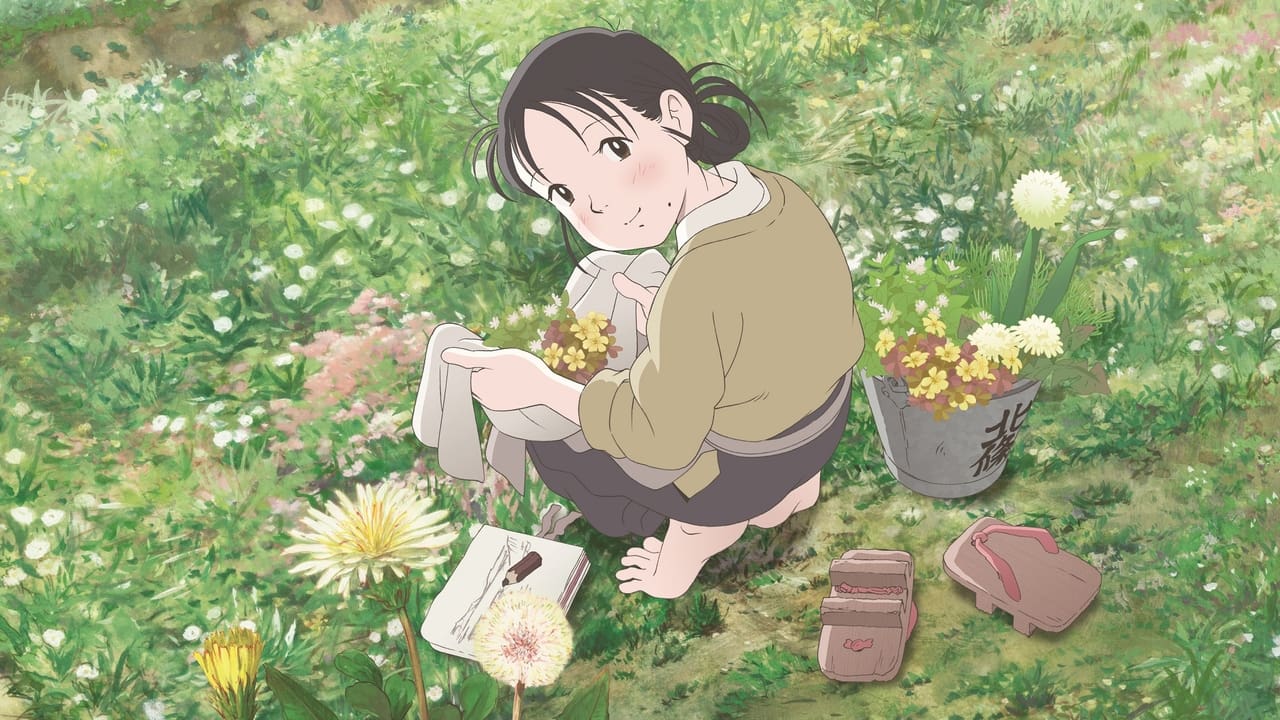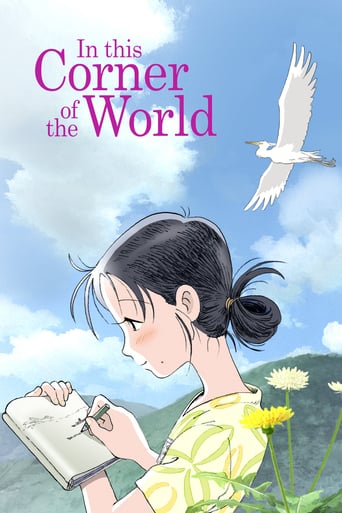

Simple and well acted, it has tension enough to knot the stomach.
... View MoreIt’s fine. It's literally the definition of a fine movie. You’ve seen it before, you know every beat and outcome before the characters even do. Only question is how much escapism you’re looking for.
... View MoreIt is an exhilarating, distressing, funny and profound film, with one of the more memorable film scores in years,
... View MoreExcellent and certainly provocative... If nothing else, the film is a real conversation starter.
... View MoreIn This Corner of the World Director:Sunao Katabuchi Rated PG-13 for thematic elements including war-related images"In This Corner of the World" is the story of a eighteen year old girl named Suzu and her life and struggles during WWII and is set in the backdrop of Hiroshima. The story and setting itself is very depressing and yet it manages to be heartwarming at times. The film really fleshes the life and struggles of Suzu and makes you feel for her, and even cry at times of shock. The animation for this film has an almost watercolor painting-esque style and is really refreshing to look at, Having said this, the film does have flaws. For example, it's run-time of 130 minutes, at times it can feel really slow and sometimes boring and some scenes felt dragged on. However, things pick up in the second half of the film. Certain scenes that stood out were definitely the bombings, the scenes tend to have ominous and silent music and when the bombs drop, it explodes (no pun intended) with loud blasting sound effects, and it's really shocking. OVERALL, "In This Corner of the World" is an entertaining life study of a struggling girl with great animation, heartbreaking moments and some unforgettable scenes that stay in your head. Score:7/10
... View MoreNow as there are many japanese or non-japanese movies about the world war two, most of them are focused on the affected areas by the bombs. But this one was wasn't entirely focused on that. This movie talks about the story of a woman (Suzu) from Hiroshima, who gets married and then moves away. The story follows her as she lives her daily life in a corner of this world that is full of war and despair and how the things get worse day by day. It talks about the struggle that these people have to go through, and all the pain they are to endure. After watching this movie now i can say that i might understand a little bit more the feelings of the people and what they had to go through at that time. Of course, we can never know how much it hurt to live like that, but we could at least imagine. Imagine not being able to hold the hand of someone whom you love, imagine not being able to hear the one you love or see them again, or not being able to hug them even though you want to. After losing someone important to her and also losing her hand she had to go through much pain, she couldn't draw any longer and what for? Humans. Yes, because of some "humans" she had to let go of many things, and this is only one person, now imagine millions of people, each one of them losing at least one thing that cannot be compensated. That's harsh. And also unacceptable. This movie made me realize again how filthy we humans are. The most affectionate moment in the entire movie for me was when that little girl who lost her mother got happy when she saw Suzu, imagine that little child who had to go through something like that, it's not fair. But we can also see that Suzu losing her hand wasn't entirely meaningless. Sometimes some things happen that we might never know the good in them. And this was kind of one of those things. The little girl might have never approached Suzu if she hadn't lost her arm and reminded her of her mother and she would probably die out there. But she got saved and it was like god has sent them back the little girl that they had lost. It was a very good movie in general and that art was also nice and I really loved it, i also don't mind watching it again.
... View MoreKono Sekai no Katasumi ni is a combination of anti-war propaganda and slice of life silliness. The slice of life side is the other of the 2 Japanese do. They options being "dull comedy" and "cultural shock". Except if you have ever heard of Japan before, the cultural shock won't apply because this movie doesn't tell anything new about war nor Japan. One would assume at this point that the movie relies on its strong characters. Would. What this movie does is make 2 separate entities with 2 different characters.. who happen to be a couple. The man goes to the anti- war arc which this movie has fever focus onto, and the woman, our main character, gets to live in the typical and boring slice of life settings - which we the viewers are doomed to follow for over 2 hours.Unfortunately I have pretty much ran out of things to say already. I can only repeat the caption of this review. The movie turns into a yelling and melodrama sh!tshow because instead of writing anything worth of seeing, the production team relied to the seiyuu team whose job was to sound emotional and sad and cry because oh we in such pain here. I am not very impressed by this movie. Even such mediocre Ghibli movies as Hotaru no Haka did a better job capturing the war. Even if that movie also relied on feels, at least it had something worth giving a damn about unlike in this movie which best part was the ending song - and that partly because it confirmed that the movie was finally over and no one would cry without any reason anymore.
... View MoreReviewers want this exquisite and heartbreaking film to be a tightly focused wartime narrative but that it is not. We follow Suzu through several of life's terrifying (and often involuntary) leaps of faith. We leave home with her, just a girl, and to marry a boy she never recalls having met. We live with her in a marital house that is at times welcoming and at others rank with hostility. We see her reforge her attachments to family and become part of a new one; we see this house become her home, her place of work and something she will fight furiously to defend. There is the numbness and then bottomless acceleration of grief; the desensitisation to loss; a distance, a cold strength by the time more former intimates are gone. An honesty to the development of her marriage, the elements of loving warmth and explosions of tension. The imperfections of characters brought into proximity and friction. A nuanced portrayal of a perceived love-triangle and the way it is both uncharacteristic of stereotypes about this era but also entirely plausible in light of how wartime fatalism shapes emotional experience. Suzu is completely charming in her tirelessly hardworking and yet creatively daydreaming tendencies. Though her life is brutal at times, her perspective on her lot, and on the natural and human beauty which surrounds her, makes the idea of a now forgotten life of domesticity in prewar Japan almost seem appealing! To look back on her, the world that she sketched and painted in her mind's eye, the characters with whom she was co- dependent, feels like looking back with tearful nostalgia toward real friends now lost in time - the same emotions felt at the close of any great film, and in particular, most of the grown-up output of Studio Ghibli (apologies for the predictable reference). Really priceless.
... View More